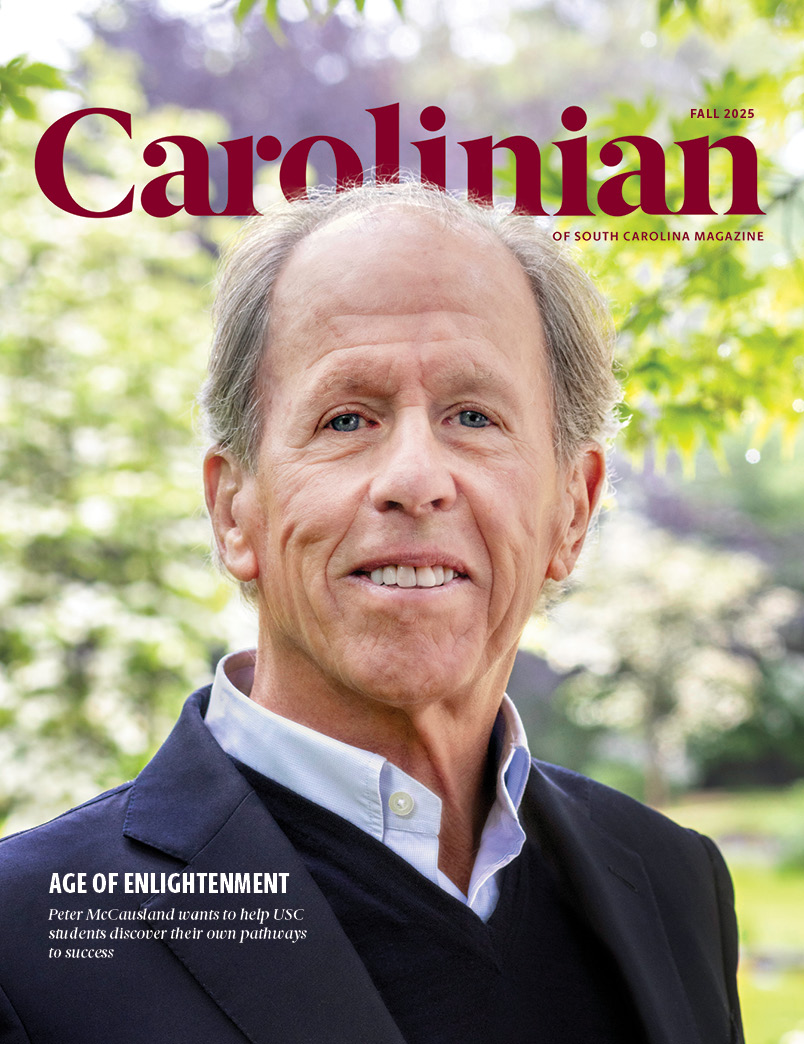Stamps of Approval
For new University of South Carolina President Michael Amiridis, consensus building is a hallmark of good leadership. Many of the people who worked with him during his first run at USC are already on board.
Posted on: July 27, 2022; Updated on: July 27, 2022
By Craig Brandhorst, craigb1@mailbox.sc.edu, 803-777-3681
In January, as the Board of Trustees prepared to announce the 30th president of the University of South Carolina, the man of the hour, Michael Amiridis, took a beat. He had been going almost nonstop since flying in from Chicago for the final round of interviews and campus meetings, and he was finally able to enjoy a moment of personal reflection.
“I had the opportunity to think about the first time that I came to South Carolina in 1994 and how different the city and the university look now,” says Amiridis, who began his academic career as an assistant professor of chemical engineering nearly 30 years ago. “I had the opportunity to think about my appointments as department chair, as dean, as provost, and how much more complex things get as you progress through these levels.”
But Amiridis also thought about another red-letter day — when he was announced, back in 2015, as the new chancellor at the University of Illinois Chicago. The excitement seven years ago may have been similar — the stakes were certainly high enough — but the circumstances of the latest announcement felt different, less an introduction, more so a homecoming.
“I was about to go into a room where I knew 80 percent of the people,” he says with a grin. “In Chicago, when that announcement was made, I was in a large room, and I was desperately trying to find somebody in the crowd that I knew.”
Obviously, it took more than a few familiar faces to bring Amiridis back to Columbia.
He speaks glowingly
of the university’s historic campus and its rich history. And he is firmly committed
to the university’s core academic and research mission. But having a network of trusted
colleagues across campus didn’t hurt when he and his wife, Ero, were weighing the
decision — and it won’t hurt as he continues to lay out his ambitions for the state’s
flagship public university.
“One of the key roles of the leadership of the university is to motivate people in a common direction, a common cause,” he says. “The way to do this is to articulate an attractive vision, explain what we are going to do and why is this important, because everyone wants to believe, wants to be engaged, is much more productive, if they’re doing something that they believe is meaningful.”
Melissa Moss
Chemical engineering professor Melissa Moss joined the College of Engineering and Computing in 2004, while Amiridis was chair of chemical engineering. She was named chair of chemical engineering and biomedical engineering in 2021.
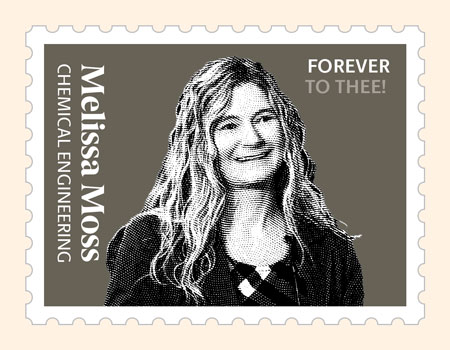
Even when I was a young faculty member, I can remember him popping in my office or my lab and asking my opinion on some things, and I think he did a lot of that. Sometimes consensus building isn’t just trying to sway opinions. He was trying to know where the faculty stood on something before he put them all in a room together to talk about it. That seems like a simple thing, but it’s actually time consuming and difficult to do.
He’s very good at talking to people and he’s very well-rounded. I think this is part of why he will be good at interfacing with people outside of the university and why he’s going to create good relationships with prospective donors. I think he has a real style for that. That’s maybe something he wouldn’t necessarily say about himself, but he’s really good at selling what’s great about this place and it’s sincere.
He is also very good with students. As chair, you do a lot of student recruiting, and he always encouraged students to be well-rounded and get involved. We saw a lot of students that had an interest in music but that wanted to be engineers, and he would talk to them about how these things in some ways can mesh together. He was always supportive of students pursuing things that weren’t necessarily math and science and encouraging them to find space in their curriculum or beyond the classroom to pursue those interests.
When he left for UIC, people really wanted to keep him here and give him the opportunities he was looking for, which I think speaks to how well he was appreciated and liked. And obviously in my department we all know him very well, so we are pretty excited for him to come back.
Joel Samuels
College of Arts and Sciences Dean Joel Samuels serves as executive director of the Rule of Law Collaborative and reported to Amiridis during his time as provost.
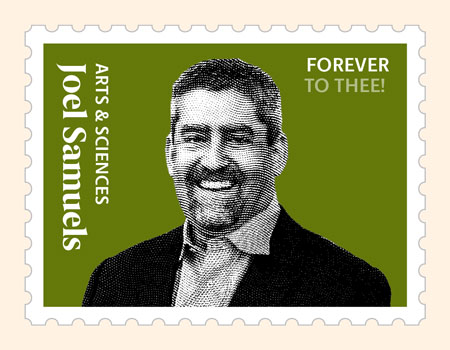
I first got to know Michael well when he served as the provost — indeed, he was the university leader who launched my administrative career. He named me, initially, as the associate director, and eventually director, of the Rule of Law Collaborative (ROLC), which operates under the Office of the Provost.
When I became Director of ROLC, it was a small organization with a very small annual budget. Since that time, it has grown more than ten-fold into a full-time team of more than 12 people and a multimillion-dollar annual budget with impact to match and projects all over the world. That growth was based on calculated risks, and Michael encouraged me to take those risks. When I came to him with ideas that involved a certain amount of risk, but where there was a potentially good reward and the downside wasn't too high, he worked with me, supported me and encouraged me in important ways.
Now, in my current role, I look forward to Michael’s return because he understands the essential role that the College of Arts and Sciences plays both in students’ educational journeys and in achieving the university’s research mission. His vision and leadership will bring the colleges together to collaborate in support of teaching, research and community engagement, all of which will impact our city, our state and our nation.
One of my favorite features about Michael as a leader is that he expects excellence, he incentivizes excellence and he rewards excellence. An institution that is driven towards excellence will be outstanding. In Michael, we’re getting a committed and visionary leader who wants to be president of this university — not president of a university — and who has seasoned leadership skills and a deep simultaneous commitment to student-centered education and to research excellence. It is an exciting time for our university.
Mary Anne Fitzpatrick
Educational Foundation Distinguished Professor of Psychology and Communication Mary Anne Fitzpatrick has served the university in a variety of leadership roles, including dean of the College of Arts and Sciences and vice provost for special academic initiatives while Amiridis was provost.
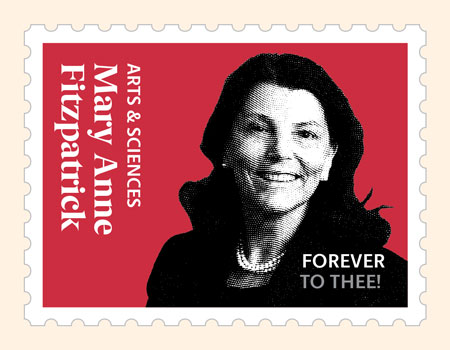
When Michael first took over as provost, we were at the beginning of a terrible downward spiral financially. He visited every academic department in the entire university to listen to the faculty, to hear what they had to say, to talk about what he intended to do. Even though he’d been here his whole career, he wanted to make sure he understood the larger community. I was extremely impressed that he would spend that time and that energy trying to get to know everyone.
Michael has no trouble making decisions, but he really does listen. He listens to all sides and tries to consider as many points of view as he can. He’s out there looking for new ideas, looking for ways to piece things together. He doesn’t assume he’s always the one with the right answers, and so he can attract a lot of high-end talent and create the best environment for the future. There are a lot of smart people who really think only their ideas count. That’s not Michael.
He also cares deeply about the quality of undergraduate education, and he tried to recruit the very best graduate students in order to create some innovative undergraduate programs. That’s what you have to do in a research university. The best faculty bring in the best graduate students who then become the best assistants in labs and in smaller classrooms. He was very creative in that way, very big on supporting first-class research, research laboratories, all those things that we need.
We’re very lucky to have both him and his wife, Ero, coming back. It’s really a lovely fit, and it’s just such a delight to deal with them again because they are obviously so delighted to be coming back to South Carolina.
Allen Miller
Carolina Distinguished Professor of Classics and Comparative Literature Allen Miller served as vice provost for international affairs from 2014 to 2020 and worked closely with Amiridis on multiple fronts.
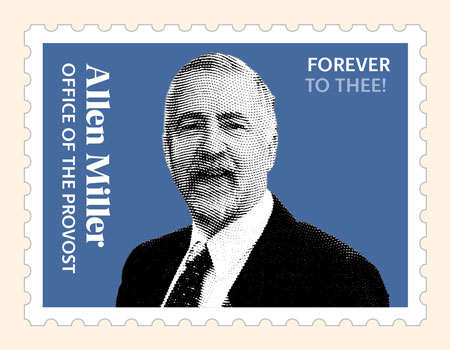
Michael always used to say, “We’re going to come to work every day, we’re going to work very hard and we’re going to have a smile on our face,” and that’s the way it was. He was intense — we were intense — but the atmosphere in the provost’s office was very collegial. People enjoyed a good joke and a good laugh. You looked forward to coming to work.
We endured some crises. In the fall of 2008, the bottom fell out of the economy and universities all over the country were laying people off in droves. But Michael and Harris [Pastides] said we were not going to do that and recentralized the budget model. They did that, in part, by attracting more out-of-state students. I know that’s a controversial topic, but those out-of-state students funded the university at a difficult time — and we came out on the other side a better university, a higher ranked university, a more dedicated research university.
That’s also when Michael introduced his dashboard, which was important. He picked a few areas to track, one of which was freshman enrollment, one of which was graduation rate. By spring 2010, we were one of only two or three universities in the entire country that was simultaneously growing our student body and improving both graduation rates and test scores. Generally, you do one or the other. We did both and for a very long time.
We’ve been through a lot of changes in the past few years, and it has been disruptive for the university. One thing I think that Michael will bring back is just a sense of purpose. It’s our job to be the top research university in the state of South Carolina and one of the best in the country, and I believe as president that he will bring the kind of vision and integrity to make sure we keep moving forward.
Dawn Staley
Head women’s basketball coach Dawn Staley has led the University of South Carolina to two national championships since arriving in 2008 and is a prominent voice on campus.
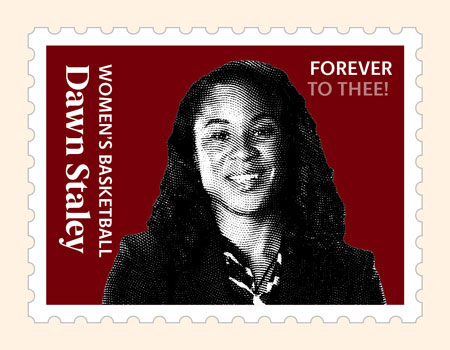
I think President Amiridis has an advantage because he’s been here before. He really knows the pulse of our university. It’s a hard job, that’s number one, but as he knows — and his wife and his family know — there are people here who will help him and allow his presidency to be legendary.
You know, he reached out to me when he was named president. It was a small thing, in a way, but it was also a huge thing, when you think about it. I don’t think very many newly appointed presidents are going to reach out to the women’s basketball coach. And what he said was even better. He just said that he appreciated my voice, not just for athletics but the entire university community. Not many newly appointed presidents would say that, either.
The rest of our university community, our staff members and our coaches and our professors and our administrators — they will all get a taste of just that. He’s going to make everybody feel like they have an important part in making the university continue to grow and be more diverse. I know he’s going to do great things for us, and I know we’re all going to bend over backwards to make sure his legacy is his greatness.
Ed Walton
The university’s executive vice president for administration and chief financial officer, Ed Walton has been at USC since 1997.
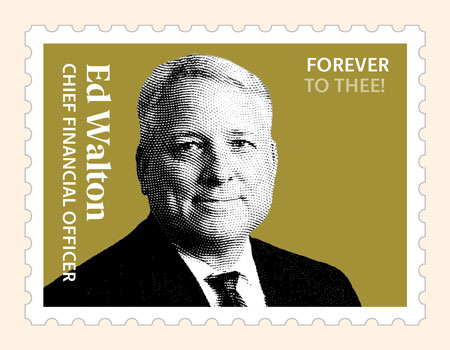
A lot of people ask me what it’s going to be like when Michael comes back as president. Here’s how I see it: Michael will be the fifth president in my time at USC, and he’ll be the only president who has come here having already led another university for seven years. That’s invaluable to have that sort of experience. You back that up with his prior experience at USC — 20-plus years coming up through the academic ranks, knowing South Carolina, having reared his children here. He’s a South Carolinian and an experienced president. It’s a dream combination.
We worked together during the Great Recession to help the university survive and prosper, and our technique there was to grow the institution. Without a doubt we have done that by any measure. We have more faculty, we have better faculty, we have more and better students. We’ve stayed solvent and in the black the whole time.
Now we have two more challenges. One is that the cost of education has gotten to be so much that students and their parents rightfully complain. The other challenge is that we’re seeing the economic effects of inflation. Charging students and their families more is difficult — we’ve frozen tuition here for four years. Michael is an administrator without peer, and he’s decisive. We’ll sit down with him and go over all the all the ins and outs of where we are. He’ll know what to do as far as leading us through these next challenges.
John Dozier
The institute community and equity officer at Massachusetts Institute of Technology, John Dozier served as the University of South Carolina’s chief diversity officer from 2013 to 2020.
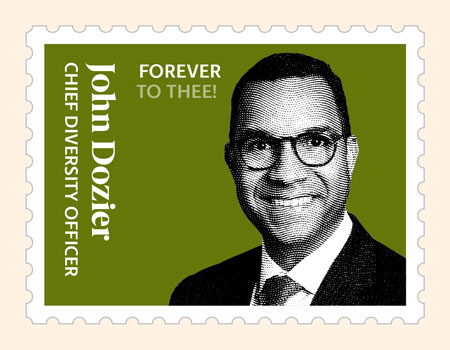
It’s a well-known adage that if you want to see what someone values, find out where they spend their time and their money. Michael was invested in understanding DEI, and how the university should approach this challenge in a way that ensures some level of sustainability. He approached it with an understanding that if this isn’t at the core of the academic enterprise, it’s not going to happen. That speaksto how the groundwork was laid for transitioning the DEI position from Human Resources to the Provost’s Office. That happened when Joan Gabel was provost but that conversation started before Joan got there.
Although the more proactive diversity, equity and inclusion work was still somewhat nascent at the time, he embraced it and understood that this is a strategic differentiator, not just something that we should be doing because it’s morally right.
The University of South Carolina, and higher education more broadly, is facing a lot of challenges. There are questions about the value of a college education. There are questions about the sustainability of higher education as costs continue to rise. What the university has coming in as its next president is someone who not only understands those challenges, but someone who is uniquely prepared because of the time that he spent at the University of South Carolina and his understanding of the politics and culture of the institution, as well as the perspective and experience gained in a place like Chicago.
The University of South Carolina is a special place to me. I still own homes in Columbia, less than a mile away from the university. I have two children enrolled at the university, and my wife is an alumna. With Michael, I feel a sense of security in many ways, knowing that we have in him a thoughtful leader who will lead the university in a positive direction. We have in Michael a leader who is well prepared to fulfill the aspiration of the university as it relates to the partnerships and opportunities that the state needs from it, and the promise that a public university makes to the state’s people — to be an accessible institution that considers its diversity as a central part of the formula that informs its best days ahead.
Dennis Pruitt
Dennis Pruitt is vice president for student affairs and vice provost. He has led the university’s Division of Student Affairs and Academic Support since 1983.
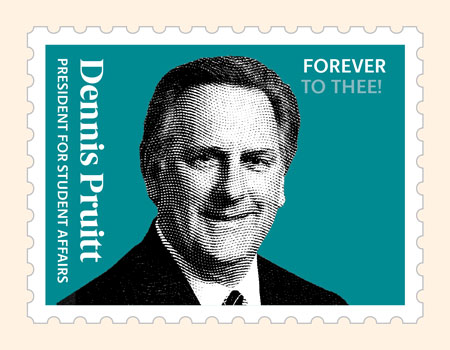
What we always liked about Michael when he was here before was that he’s a realist. He knows how things are. But he’s also kind of a romanticist. He knows how things should be. And he was always trying to figure out how we get there. We saw him do that time and time again while he was here as an academic administrator. He’s one of those people who connects the dots.
He’s always looking at the trends, always looking at what’s next. He’s got a sense of future pull. A lot of people deal with the reality of today, but he’s always looking at tomorrow and the next day and a year from now or five years from now.
He also has the ability to see things from the perspective of others. He can see things through the perspective of a faculty member. He’s been one. And he can see things through the perspective of a department chair, a dean, a provost, a parent, a student, a spouse of a student — because he’s been all of these things, too.
But maybe the thing I like the most about Michael is his energy. He has a relentless energy to make things better, to make this a better university, to make it better for students, for faculty, for employees.
You know, we live in a culture of despair — part of it is COVID-driven, part of it relates to issues of social justice and moral confusion — but he has a positivity and a can-do spirit. You really see it in him. He walks into a room and people sit up. They light up and they’re ready. They know he’s going to come in with something enlightening or stimulating, or he’s going to challenge them, or he’s going to say, “We’ve got to fix this problem. Let’s figure it out.”
David Crockett
After 20 years at the Darla Moore School of Business, where he interacted with then-Provost Amiridis as part of his department’s tenure and promotion committee, marketing professor David Crockett accepted a position at the University of Illinois Chicago and gained additional insight into Amiridis’s reputation as a leader.
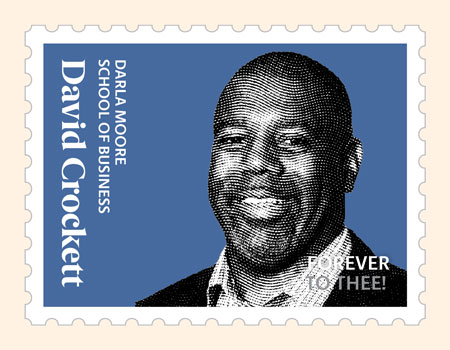
I think Michael had a difficult task as provost in the sense that USC is very de-centered as a university. For the colleges, and even the departments in many ways, the longstanding culture had been that those units sort of did their own thing, and part of what he did as provost was to try to impose some order on that. On the one hand, I respected what he was trying to do. On the other hand, he was trying to impose order, so there were times when some faculty felt like he pushed the wrong buttons.
I have a little bit better feel for him since I arrived at UIC. In many ways, the outward facing role of a president seems to really suit him well. Seriously. I’ve said this to multiple people at USC since I got to UIC: You can’t find anybody here who will say a bad word about him. And I dug deep! I went to people who I would presume would have reason to be critical.
You don’t hear fawning praise — it’s not like that, it’s not a cult of personality kind of thing — but people across the board feel like he’s done a really good job here. They all say the same sorts of things, that the university grew under his watch, that UIC has achieved a kind of status in this city that it never had before. I sound like a cheerleader, and I really don’t mean to, but people recognize that things have changed under his leadership. He’ll be missed.
